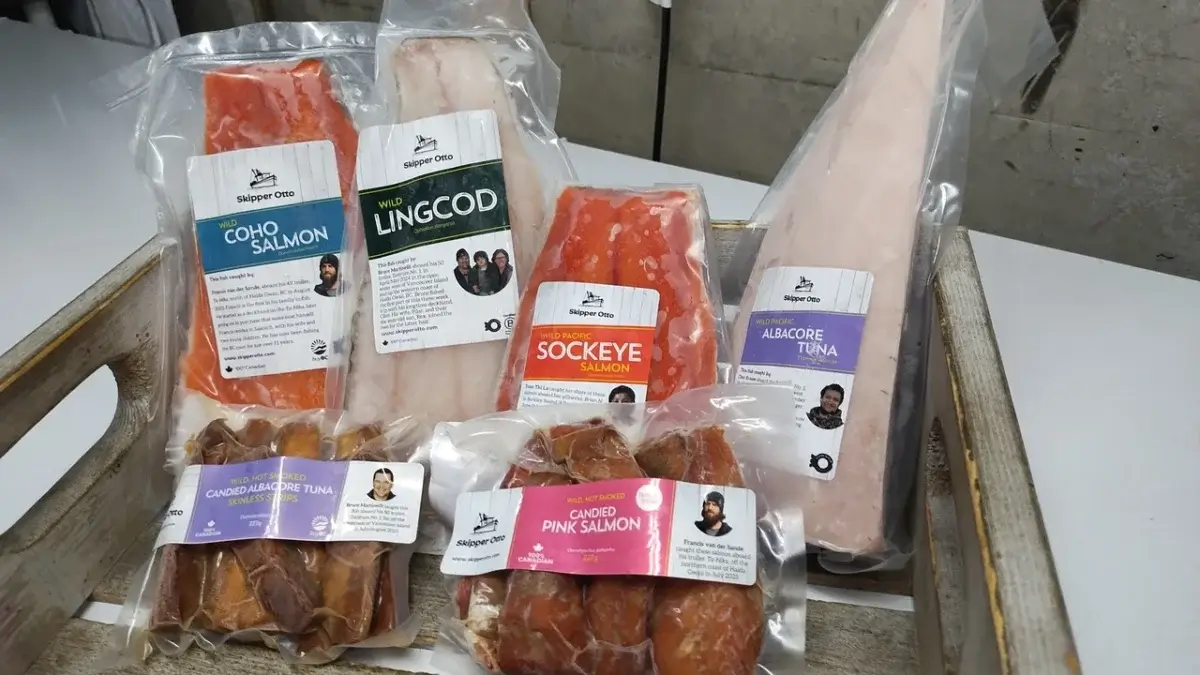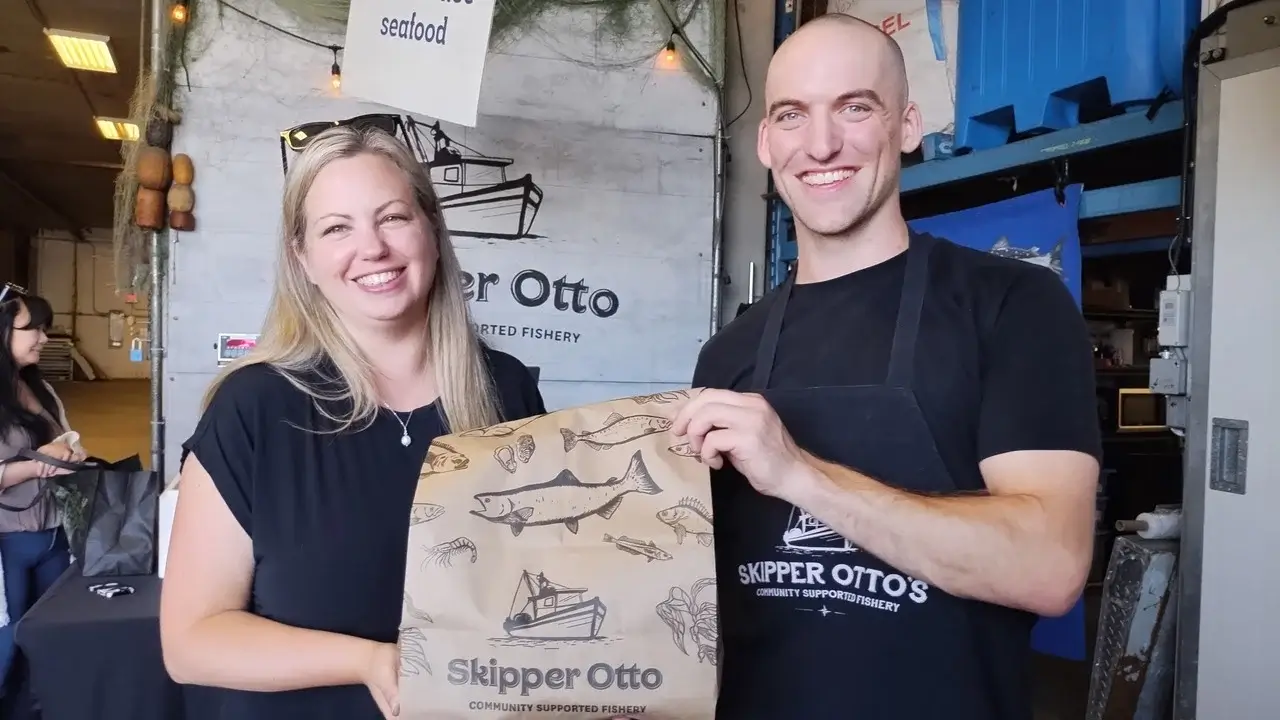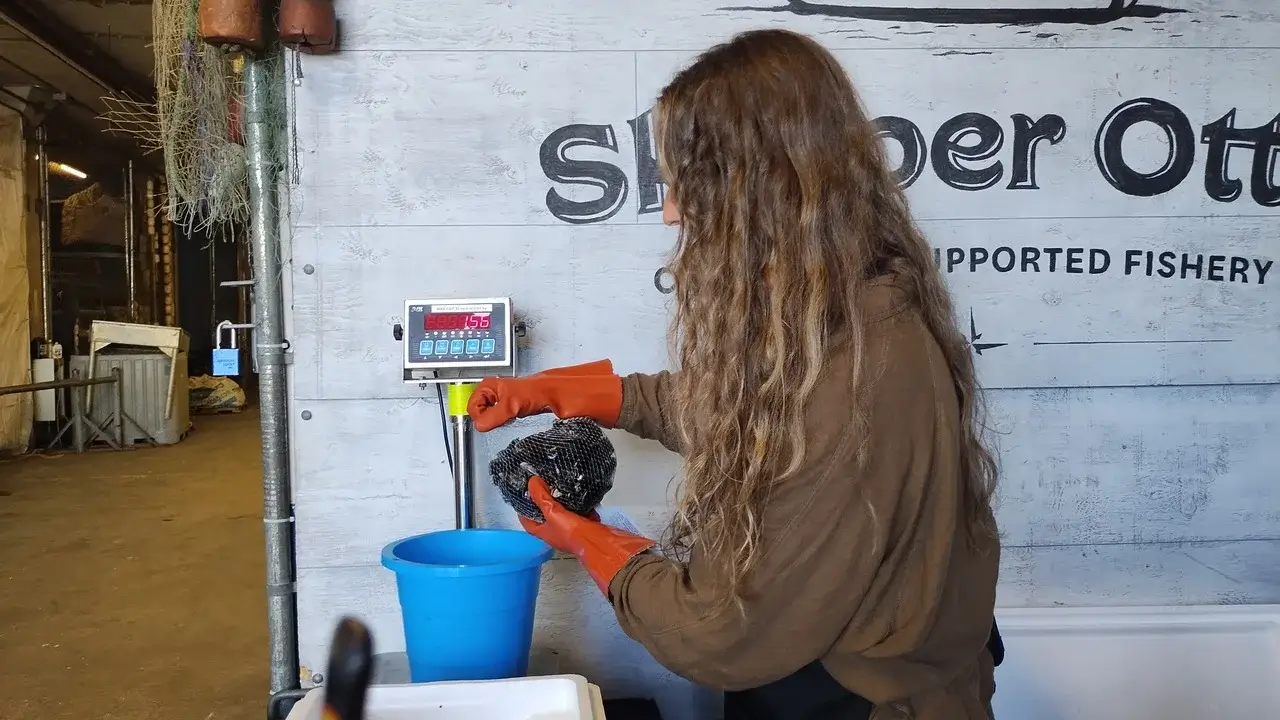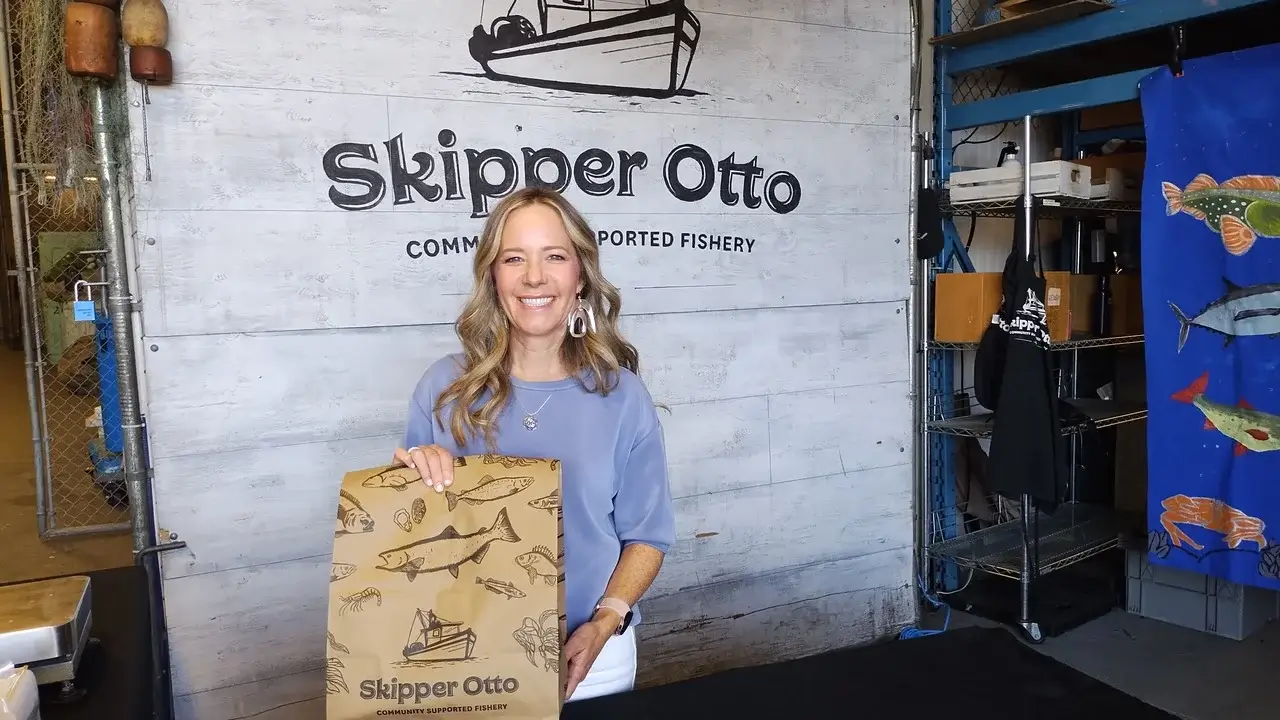Spotlight On a Community-Supported Fishery
Skipper Otto, a community-supported fishery in Vancouver, is impacting how seafood is valued—one catch at a time.
Spotlight On a Community-Supported Fishery
Skipper Otto, a community-supported fishery in Vancouver, is impacting how seafood is valued—one catch at a time.

A typical Skipper Otto customer haul.Photography by Jennifer Cole.
It’s Thursday afternoon, and a steady stream of people are arriving at Fisherman’s Wharf in Vancouver B.C. to pick up grocery bags full of frozen lingcod, salmon, or halibut. They are just a few of the customers who sign on for a year’s subscription to Skipper Otto, a Community-Supported Fishery (CSF).
“I am so excited I can have this at home,” says Allison Hepworth who just picked up her bag of fish. Knowing how and where the fish was caught makes a difference to Hepworth. Each package of seafood has a picture of the fisher who caught it, and where and when it was caught. It reminds members that when you become a member of Skipper Otto, you not only get delicious seafood, but you have played a role in supporting the livelihoods of small independent fishers.

Founded in 2008, by Sonia and Shaun Strobel, Skipper Otto is named for Shaun’s Dad, Otto. When Otto began fishing in the 1960s, there were thousands of independent small-scale fishers harvesting seafood along B.C.’s coast, and making a good living. Over time, changes in government regulations have allowed massive factory ships owned by large corporations to gobble up fish, which increased the length of the supply chain. In the United States, the National Oceanographic and Atmospheric Administration (NOAA) estimates that 70 percent to 85 percent of seafood in stores is imported. Imported seafood can either mean it was harvested from global waters, or caught in the US, but exported to other countries for processing and then returned to the US. This creates a lack of transparency for the consumer on the origin of their food and adds up to lower wages paid to local harvesters.
It’s also risky relying on imported seafood. Shocks such as extreme weather or geopolitical events can disrupt global supply routes and threaten the ability of seafood to be safely traded on a global scale.
“The fishing way of life is endangered, and local fishers are losing access to markets,” says Sonia Strobel.
TAKE ACTION
Find and support local, sustainably caught fish with the Local Catch Network.
This is where a Community-Supported Agriculture (CSA) model comes in. Or, in this case, a CSF. Similar to how a CSA model invites members to invest in a local farm and purchase produce before it’s harvested, a CSF model also pre-sells seafood before it’s caught, inviting members to invest in the livelihood of independent fishers.
The pre-sale of seafood removes the uncertainty as to whether they will have a buyer for their seafood and the price they will receive for the catch. Along with guaranteed income, the nature of a CSF and a local food system allows fishers to pivot their catch to match what is available and abundant. “If one year the sockeye salmon return is low and Coho salmon are abundant, then, that is what Skipper Otto members are offered,” explains Strobel.

Skipper Otto’s 8,000 members are supplied sustainability caught fish from 45 fishing families. This growing success over the past decade and a half has made Strobel a strong advocate for independent fisheries, something put to the test in 2021. For decades, independent harvesters in B.C. have frozen tubs of spot prawns in salt water while at sea to preserve them until they return to port.
Just before the start of the 2021 spot prawn season, a reinterpretation of a government regulation that all catches must be readily available for inspection caused Canada’s Department of Fisheries and Oceans (DFO) to ban the sale of frozen-at-sea spot prawns. Frozen prawns, it was argued, weren’t readily available for inspection. This made little sense to Strobel or independent fishers, especially as they say thawing a tub of prawns took minutes. Strobel and the Skipper Otto team say the policy had the potential to collapse an industry worth $30 million to $50 million annually, and take away the livelihoods of independent spot prawn fishers, perhaps permanently. Strobel turned to Skipper Otto’s vast membership, asking them to sign petitions and write letters in protest. Skipper Otto’s influence played a role in the government reversing the policy.

Continuing to advocate, Strobel has spoken in front of Canada’s House of Commons and sits as a volunteer on the executive committee of Local Catch Network, a North American hub that advocates for local and community-based seafood systems. Through Local Catch’s mentorship program, Strobel was connected with Cadena Ragsdale, owner of Kauai Fresh Fish in Hawaii. When Ragsdale started her business in 2022, it was hard to find fresh local fish.
“We quickly realized there was a demand for fresh local fish and a transparency in where the fish came from,” says Ragsdale. As in B.C., independent fishers don’t always receive fair prices for their catches. That same story can be heard across North America.
In northern Saskatchewan, Indigenous fishers are losing markets for their freshwater catches of walleye and pike. Skipper Otto hopes to add these fishers as suppliers, offering guaranteed sales and fair market value. In Nunavut, Inuit lake fishers drive out on skidoos in the middle of winter to frozen freshwater lakes, drill holes and, using gill nets, pull in by hand their catch of Arctic char. The fish is processed, frozen and available to Skipper Otto members.
LEARN MORE
Read up on Community Supported Fisheries.
Despite expansion, Strobel doesn’t see Skipper Otto as competition with the industrial fishery. “None of us wants to catch the last fish,” she says. What Skipper Otto offers is insurance that fresh local seafood remains available and there is a robust network of small-scale fishers to catch it.
Back at Fisherman’s Wharf, Hepworth completes her order with freshly harvested mussels. At home, she will pull the frozen fish out of her freezer, as needed, and pan-fry it with butter and lemon for her family.
“We are reconnecting people to food,” says Strobel.
Follow us
This work is licensed under a Creative Commons Attribution-NoDerivatives 4.0 International License.
Want to republish a Modern Farmer story?
We are happy for Modern Farmer stories to be shared, and encourage you to republish our articles for your audience. When doing so, we ask that you follow these guidelines:
Please credit us and our writers
For the author byline, please use “Author Name, Modern Farmer.” At the top of our stories, if on the web, please include this text and link: “This story was originally published by Modern Farmer.”
Please make sure to include a link back to either our home page or the article URL.
At the bottom of the story, please include the following text:
“Modern Farmer is a nonprofit initiative dedicated to raising awareness and catalyzing action at the intersection of food, agriculture, and society. Read more at <link>Modern Farmer</link>.”
Use our widget
We’d like to be able to track our stories, so we ask that if you republish our content, you do so using our widget (located on the left hand side of the article). The HTML code has a built-in tracker that tells us the data and domain where the story was published, as well as view counts.
Check the image requirements
It’s your responsibility to confirm you're licensed to republish images in our articles. Some images, such as those from commercial providers, don't allow their images to be republished without permission or payment. Copyright terms are generally listed in the image caption and attribution. You are welcome to omit our images or substitute with your own. Charts and interactive graphics follow the same rules.
Don’t change too much. Or, ask us first.
Articles must be republished in their entirety. It’s okay to change references to time (“today” to “yesterday”) or location (“Iowa City, IA” to “here”). But please keep everything else the same.
If you feel strongly that a more material edit needs to be made, get in touch with us at [email protected]. We’re happy to discuss it with the original author, but we must have prior approval for changes before publication.
Special cases
Extracts. You may run the first few lines or paragraphs of the article and then say: “Read the full article at Modern Farmer” with a link back to the original article.
Quotes. You may quote authors provided you include a link back to the article URL.
Translations. These require writer approval. To inquire about translation of a Modern Farmer article, contact us at [email protected]
Signed consent / copyright release forms. These are not required, provided you are following these guidelines.
Print. Articles can be republished in print under these same rules, with the exception that you do not need to include the links.
Tag us
When sharing the story on social media, please tag us using the following: - Twitter (@ModFarm) - Facebook (@ModernFarmerMedia) - Instagram (@modfarm)
Use our content respectfully
Modern Farmer is a nonprofit and as such we share our content for free and in good faith in order to reach new audiences. Respectfully,
No selling ads against our stories. It’s okay to put our stories on pages with ads.
Don’t republish our material wholesale, or automatically; you need to select stories to be republished individually.
You have no rights to sell, license, syndicate, or otherwise represent yourself as the authorized owner of our material to any third parties. This means that you cannot actively publish or submit our work for syndication to third party platforms or apps like Apple News or Google News. We understand that publishers cannot fully control when certain third parties automatically summarize or crawl content from publishers’ own sites.
Keep in touch
We want to hear from you if you love Modern Farmer content, have a collaboration idea, or anything else to share. As a nonprofit outlet, we work in service of our community and are always open to comments, feedback, and ideas. Contact us at [email protected].by Jennifer Cole, Modern Farmer
September 16, 2024
Modern Farmer Weekly
Solutions Hub
Innovations, ideas and inspiration. Actionable solutions for a resilient food system.
ExploreExplore other topics
Share With Us
We want to hear from Modern Farmer readers who have thoughtful commentary, actionable solutions, or helpful ideas to share.
SubmitNecessary cookies are absolutely essential for the website to function properly. This category only includes cookies that ensures basic functionalities and security features of the website. These cookies do not store any personal information.
Any cookies that may not be particularly necessary for the website to function and are used specifically to collect user personal data via analytics, ads, other embedded contents are termed as non-necessary cookies.
What a fantastic idea, taking the CSA model and applying it in this way.
Shaun and Sonia have done more for local fishing communities, the fishermen and their families than any government agency. Plus providing the freshest and most sustainable seafood by catching what’s in season and available instead of Wiping out whole schools of fish, freezing them and then shipping them halfway around the world to your stores freezer .
And I know them from Local Catch !
:🍤